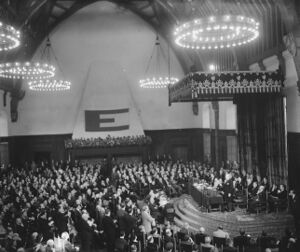1948 Hague Congress
The Hague Congress or the Congress of Europe[1] was a conference that was held in The Hague from 7–11 May 1948 with 750 delegates participating from around Europe as well as observers from Canada and the United States of America. Many of the groups organizing the conference received covert funding from the CIA.
Official narrative
The Congress, organized by Duncan Sandys and Józef Retinger, brought together representatives from across a broad political spectrum, providing them with the opportunity to discuss ideas about the development of European political co-operation. It was held under the auspices of the International Committee of the Movements for European Unity, subsequently to become the European Movement after the Congress.[2]
A broad range of philosophers, journalists, church leaders, lawyers, professors, entrepreneurs and historians also took an active role in the congress. A call was launched for a political, economic and monetary Union of Europe. This landmark conference was to have a profound influence on the shape of the European Movement, which was created soon afterwards.
CIA funding
Many of the groups organizing the conference received covert funding from the CIA. The front group the American Committee on United Europe was used for this purpose.[3]
Sponsor
| Event | Description |
|---|---|
| American Committee on United Europe | CIA front organization. Proves European unity movement was a heavily US-driven project. |
Known Participants
29 of the 102 of the participants already have pages here:
| Participant | Description |
|---|---|
| Konrad Adenauer | German (deep?) politician, CDU leader |
| Julian Amery | MI6, deep politician who chaired Le Cercle for several years. |
| Raymond Aron | French sociologist who attended 3 Bilderbergs from 1957 to 1966 |
| Edward Beddington-Behrens | Deputy Chief of the Secret Intelligence Service for a year during WW2. Attended the 1958 Bilderberg. |
| Winston Churchill | |
| Auguste Cool | Belgian anti-communist labour leader and suspected deep state operative. |
| Richard Coudenhove-Kalergi | The founder of the first influential movement for a united Europe. |
| Lionel Curtis | Senior UK deep state operative, the first honorary secretary of Chatham House |
| Jean Drapier | Principal Private Secretary to Belgian Prime Minister Paul-Henri Spaak, went to 3 of the first 4 Bilderbergs |
| Anthony Eden | A UK Prime Minister who did not attend the Bilderberg, although his son did. |
| Peter Fleming | British adventurer, spook,journalist, soldier and travel writer. |
| Walter Hallstein | Taken prisoner by the Americans in June 1944, where he was selected for special training as part of "Project Sunflower", a reeducation plan for possible future decision-makers. Became one of the founding fathers of the European Union. Multi-Bilderberg |
| Ole Bjørn Kraft | A Danish conservative politician whom Józef Retinger consulted when setting up the Bilderberg group |
| Walter Layton | The Economist/Editor 1922-38, The Economist/Chair 1944-63 |
| Harold Macmillan | UK PM |
| François Mitterrand | President of the France 1981-1995 |
| Adriano Olivetti | Italian industrialist possibly murdered by the CIA during a hostile takeover of his revolutionary computer department by General Electric. |
| Henk Oosterhuis | Attended the first Bilderberg as President of the Netherlands Federation of Trade Unions, and also the 1956 Bilderberg |
| Franciscus Otten | |
| Pieter Otten | Director of Philips for 22 years |
| Denis de Rougement | Attended the first 4 Bilderbergs. Promoted European federalism |
| Jacques Rueff | Mont Pelerin Society, 1958 and 1959 Bilderberg |
| Bertrand Russell | UK philosopher and pacifist |
| Paul Rykens | Dutch businessman and friend of Józef Retinger who was initially consulted on the founding of the Bilderberg Group |
| Altiero Spinelli | Italian politician, referred to as one of the founding fathers of the European Union. |
| Jan Tinbergen | Dutch economist who was awarded the first Nobel Memorial Prize in Economic Sciences in 1969 |
| Herbert Tingsten | Swedish publisher who attended 3 of the first 4 Bilderbergs |
| André Voisin | French chemist who attended the first Bilderberg and two others. Died suddenly of a heart attack in Cuba |
| Paul van Zeeland | Pre-WW2 Prime Minister of Belgium, 6 Bilderbergs in the 1950s |
